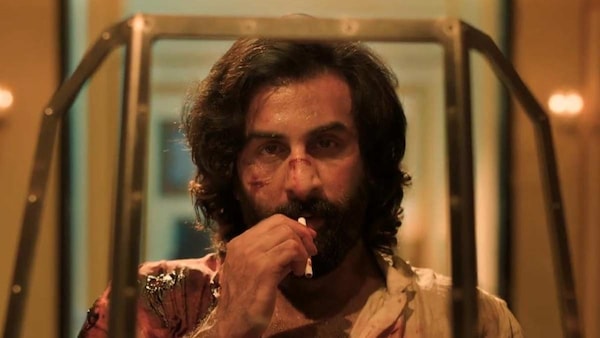There's Just One Main Character In Sandeep Reddy Vanga’s Films: His Provocative Directorial Voice
Be it Kabir Singh, Arjun Reddy or his latest, Animal, ultimately Vanga is the self-proclaimed hero of all his films and he announces it not-so-subtly.

Last Updated: 04.30 PM, Dec 10, 2023
Sandeep Reddy Vanga’s Animal is a lot of things. It’s a loud, sometimes stylish, sometimes messy and faux-masculine story of abandonment issues. It’s feminist rage-bait, as this piece from The Swaddle rightfully points out. It’s small dick energy, as this review in OTTPlay points out. It’s a complex (sometimes disjointed) portrayal of the inner animalistic instinct of a tormented modern man. It is an ambitious and violent metaphor of how the patriarchy impacts men. It’s a love letter to a destructive and dangerous idea of an “alpha male” that Vanga is clearly infatuated with. It is a beautifully vulnerable and judgement-free performance by Ranbir Kapoor, and I can’t ever say career-best because I walk out of every Ranbir Kapoor performance feeling that way. Here’s what it is not: a good film.
And it has that in common with his previous two films, Arjun Reddy/Kabir Singh. His provocative directorial voice is the main character in all his films, leaving no room for logic and nuance in character arcs and narrative flow. There are no engaging scenes that give you goosebumps. There aren’t moments that pause your train of thought and make you want to jump into the world that is being built. There are noisy statements being made, and audiences are either expected to clap along or get offended. Are his films political (I'm being generous by using “political” here when the statement/messaging often toes the line of misogyny) and cinematic? Yes. But they aren’t able to rise above his voice.
In Animal, Vanga prioritises swag and aggression, and is desperate to Make. A. Point. Along the way, he compromises on depth in his storytelling. He wears his problematic stances on his sleeve like a badge and all criticism coming his way are like those bullets in the famous Matrix scene, that he has to out-manoeuvre. Ultimately Vanga is the self-proclaimed hero of all his films and he announces it not-so-subtly.
But here’s the thing: he is not above criticism, nope. He is deeply impacted by it and it ends up becoming his central focal point. It’s what makes his films so much about that proverbial f*** you to his critics. And it’s not just film critics, as Rahul Desai points out in this long review. It’s all his critics.
Let’s rise above the film for a moment, though. I would go as far to say that the performances of Bobby Deol and Ranbir Kapoor are the best part of Animal, and they’re contributing to its massive box office success. It’s so fascinating to see Bobby Deol’s character unravel into an almost-psychotic, unhinged antagonist. The raw truth in his flaws have ended up resonating with audiences, in the same way that Ranbir Kapoor’s dizzying performance does. These characters don’t claim to be morally sound, they don’t claim to be superior because of their alpha-ness. They wear it on their sleeve as a defence mechanism. The world has not allowed them to be vulnerable, so they jump into the unending abyss that is excessive toxicity. Because they can, because Vanga pushes them to. They embrace their flaws and their kinks, and the vibe here is, if you don’t get it, you can f*** off. This makes for a much more watchable experience, than Kabir Singh/Arjun Reddy, which tried so hard to be a love story and in doing so, derailed what could have been a fairly decent character study.
It’s pointless to hold actors to a seemingly higher standard, or expect audiences to boycott movies because they present troublesome themes like a trophy. The actors are merely doing a job. The extreme and polarised reactions — which naturally erupt after watching a movie like Animal in which the protagonist asks a woman to lick his shoe as a form of retribution, or says that slapping is his love language — are the whole point of the film. It’s so evident. Vanga has blinders on and is waiting with a tray in his hand to collect all those reactions so he can arrange them in chronological order and sit down to sift through them one-by-one, so he can feel better about himself. We must let him do that. Think of it as giving into a stubborn child.
Writing about Animal and Vanga’s films can be exhausting. The critique is unending, you start to feel overwhelmed with where to begin, and then once you start to put your thoughts down it’s difficult to find a way to stop. But one does recognise that Vanga wants us to hate the film, so it can become fuel for the next few blockbusters coming our way. So I’m going to take this opportunity to reverse the narrative and say that movies like Animal deserve to exist. The film also reminds me of toddlers, who can be annoying, inspiring in a strange way you can’t really articulate, make you want to pull your hair out and make you feel weirdly guttural, but when they fall asleep (or in the case of Animal, in its quieter moments) you can’t help but stare at them and wonder, wow — what a chaotic monster.
